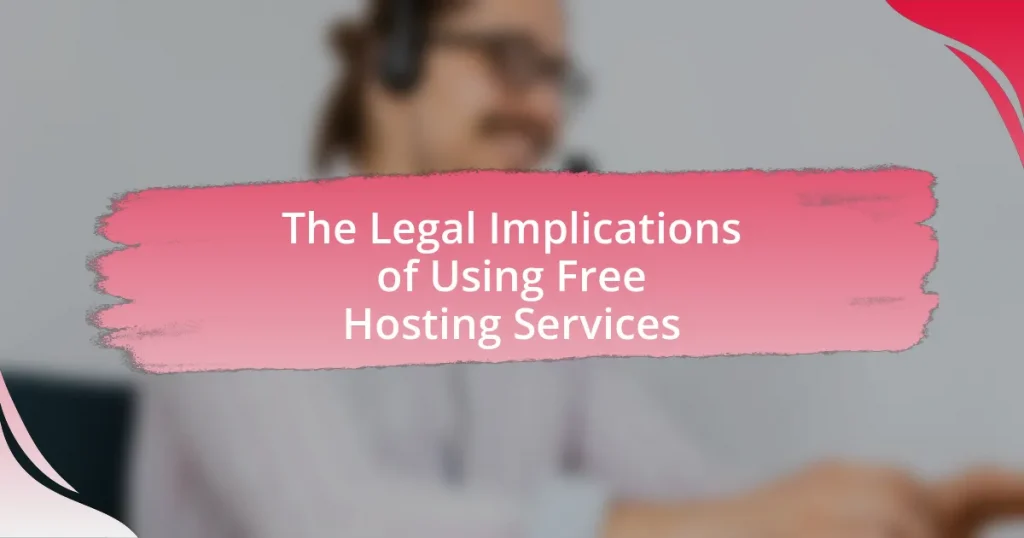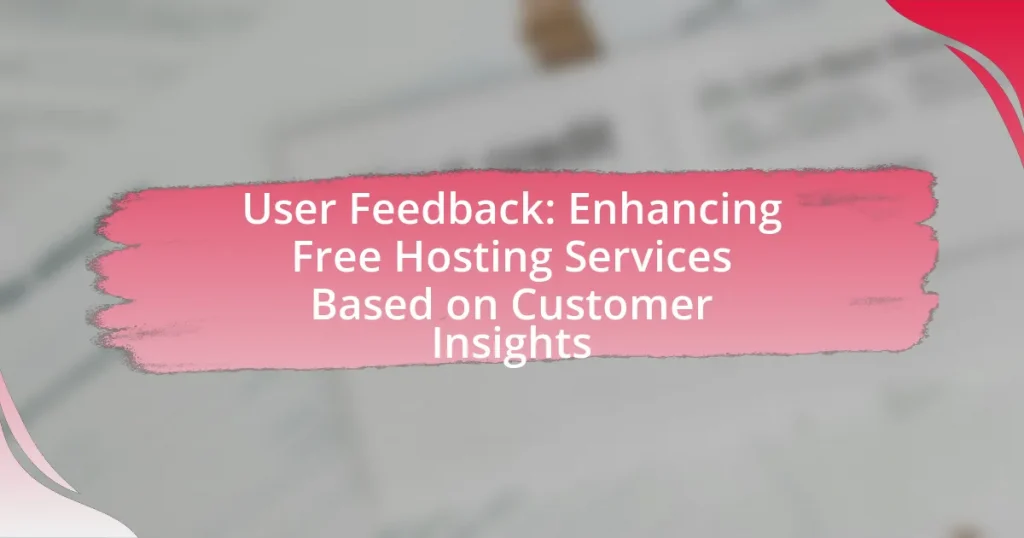The article examines the legal implications of using free hosting services, highlighting critical issues such as data privacy, intellectual property rights, and user liability for content. It outlines how free hosting providers operate within legal frameworks, including compliance with regulations like the Digital Millennium Copyright Act (DMCA) and the General Data Protection Regulation (GDPR). The article also discusses the terms and conditions associated with these services, the potential legal risks users face, and the responsibilities they have regarding copyrighted material. Additionally, it addresses privacy concerns related to data handling practices and offers best practices for users to mitigate legal issues while utilizing free hosting services.
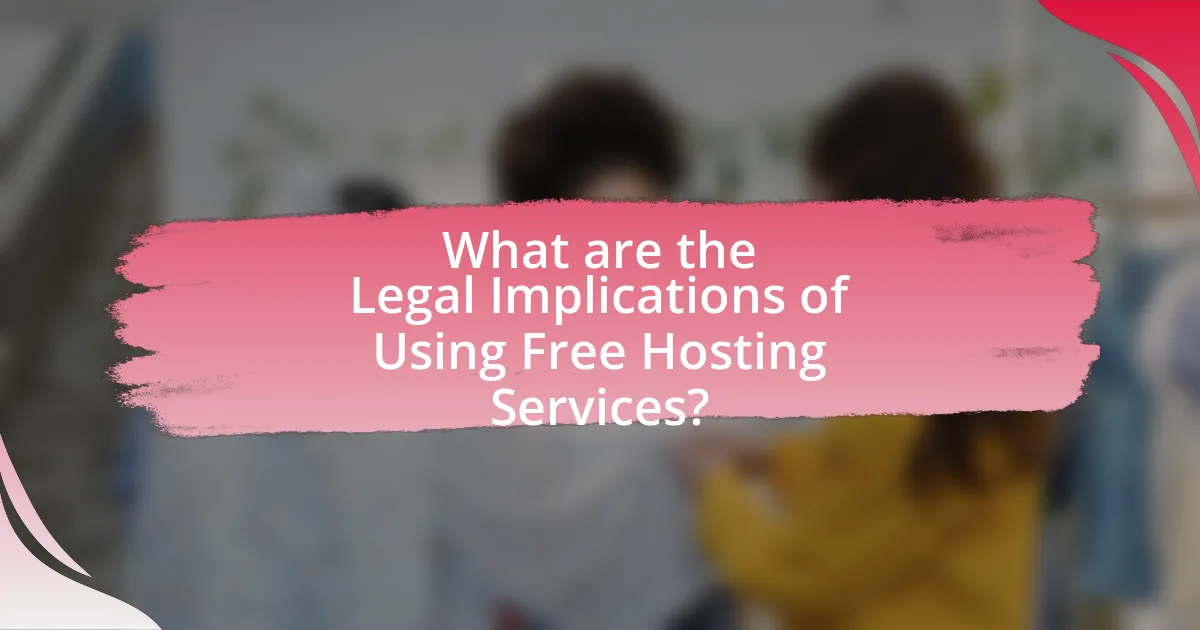
What are the Legal Implications of Using Free Hosting Services?
Using free hosting services can expose users to various legal implications, including issues related to data privacy, intellectual property rights, and liability for content. Free hosting providers often have terms of service that grant them broad rights over user-generated content, which can lead to disputes over ownership. Additionally, users may inadvertently violate copyright laws by hosting unauthorized content, resulting in potential legal action from copyright holders. Furthermore, free hosting services may not comply with data protection regulations, such as the General Data Protection Regulation (GDPR), putting users at risk of fines and legal repercussions. These factors highlight the importance of understanding the legal landscape before utilizing free hosting services.
How do free hosting services operate within legal frameworks?
Free hosting services operate within legal frameworks by adhering to regulations such as the Digital Millennium Copyright Act (DMCA) and the General Data Protection Regulation (GDPR). These services typically include terms of service that outline user responsibilities and content restrictions, ensuring compliance with copyright laws and data protection standards. For instance, under the DMCA, free hosting providers must respond to copyright infringement claims by removing or disabling access to infringing content, thereby protecting themselves from liability. Additionally, GDPR mandates that these services must handle personal data responsibly, requiring user consent for data collection and providing users with rights over their data. This legal compliance is crucial for free hosting services to mitigate risks and maintain operational legitimacy.
What terms and conditions are typically associated with free hosting services?
Free hosting services typically include terms and conditions that limit user rights, impose advertising requirements, and restrict resource usage. Users often agree to allow the hosting provider to display ads on their sites, which can generate revenue for the provider. Additionally, free hosting services usually impose bandwidth and storage limits, which can affect website performance. Many providers also reserve the right to terminate accounts that violate their policies, such as those involving illegal content or excessive resource consumption. These terms are designed to protect the provider’s interests while offering a no-cost option for users.
How do these terms affect user rights and responsibilities?
The terms associated with free hosting services significantly affect user rights and responsibilities by outlining the limitations and obligations users must adhere to while utilizing the service. These terms often include clauses that restrict users from engaging in illegal activities, sharing copyrighted material, or violating privacy rights, thereby establishing a framework for acceptable use. For instance, many free hosting services reserve the right to terminate accounts that breach these terms, which directly impacts users’ access to their content and services. Additionally, users may be required to grant the hosting provider certain rights over their uploaded content, which can limit their ownership and control. This dynamic creates a legal landscape where users must navigate their rights to privacy, content ownership, and service continuity while fulfilling their responsibilities to comply with the established terms.
What are the potential legal risks of using free hosting services?
Using free hosting services can expose users to several potential legal risks, including data privacy violations, copyright infringement, and lack of compliance with regulations. Free hosting providers often have vague terms of service that may allow them to access or misuse user data, leading to breaches of privacy laws such as the General Data Protection Regulation (GDPR). Additionally, users may inadvertently host copyrighted material without permission, resulting in legal action from copyright holders. Furthermore, free hosting services may not comply with industry regulations, which can lead to penalties for users if their content or operations are found to be non-compliant.
What types of legal liabilities can arise from using free hosting services?
Using free hosting services can lead to several types of legal liabilities, including copyright infringement, data privacy violations, and breach of terms of service. Copyright infringement may occur if users host content without proper authorization, exposing them to lawsuits from copyright holders. Data privacy violations can arise if personal information is mishandled or inadequately protected, potentially violating laws such as the General Data Protection Regulation (GDPR). Additionally, users may face legal action for breaching the terms of service set by the hosting provider, which can include restrictions on content types or usage limits. These liabilities highlight the importance of understanding the legal framework surrounding free hosting services.
How can users protect themselves from legal issues when using free hosting services?
Users can protect themselves from legal issues when using free hosting services by carefully reviewing the terms of service and ensuring compliance with copyright laws. Understanding the limitations and responsibilities outlined in the terms of service helps users avoid violations that could lead to account suspension or legal action. Additionally, users should refrain from uploading copyrighted material without permission, as this can result in copyright infringement claims. According to the Digital Millennium Copyright Act (DMCA), hosting providers are required to remove infringing content upon notification, but users can still face legal repercussions if they repeatedly infringe copyright. Therefore, maintaining awareness of legal obligations and using original or properly licensed content is essential for minimizing legal risks.
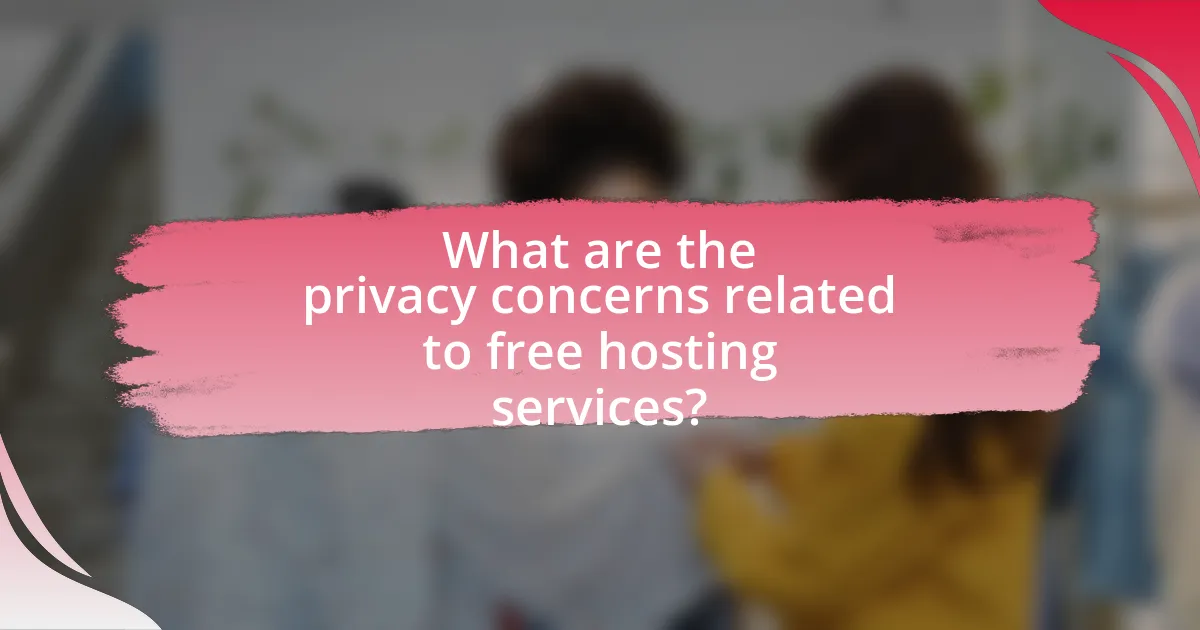
What are the privacy concerns related to free hosting services?
Free hosting services often raise significant privacy concerns due to their data handling practices. Users may unknowingly surrender personal information, as many free hosting providers monetize their services by collecting and selling user data to third parties. A study by the Electronic Frontier Foundation highlights that free services frequently lack robust privacy policies, leaving users vulnerable to data breaches and unauthorized access. Additionally, these services may not implement adequate security measures, increasing the risk of data leaks. Consequently, users must be aware that their information could be exploited, leading to potential identity theft or misuse.
How do free hosting services handle user data?
Free hosting services often monetize user data through advertising and data sharing practices. These services typically collect personal information, usage statistics, and content data to create targeted advertisements, which can lead to privacy concerns. For instance, a study by the Electronic Frontier Foundation highlights that many free hosting platforms may not have robust privacy policies, allowing them to sell user data to third parties without explicit consent. This raises significant legal implications regarding user privacy and data protection regulations, such as the General Data Protection Regulation (GDPR) in Europe, which mandates strict guidelines on how personal data should be handled.
What are the implications of data ownership in free hosting services?
Data ownership in free hosting services implies that users may not retain full control over their data, leading to potential legal and privacy risks. Free hosting providers often include terms in their service agreements that grant them rights to use, modify, or even sell user data, which can result in unauthorized access or exploitation of personal information. For instance, a study by the Electronic Frontier Foundation highlights that many free services monetize user data, raising concerns about user consent and data security. Consequently, users must be aware that their data may be subject to third-party access and that they may have limited recourse in the event of data breaches or misuse.
How does data sharing with third parties impact user privacy?
Data sharing with third parties significantly compromises user privacy by increasing the risk of unauthorized access and misuse of personal information. When users engage with free hosting services, their data may be collected and shared with external entities for marketing or analytics purposes, often without explicit consent. A study by the Electronic Frontier Foundation highlights that 79% of websites share user data with third parties, which can lead to targeted advertising and potential data breaches. This sharing diminishes users’ control over their personal information, making them vulnerable to privacy violations and identity theft.
What legal protections exist for users of free hosting services?
Users of free hosting services are generally protected by consumer protection laws, which vary by jurisdiction but often include regulations against unfair practices and the right to privacy. These laws ensure that users are not subjected to deceptive advertising, and they may provide recourse if the service fails to deliver as promised. Additionally, terms of service agreements often outline user rights, including data protection and content ownership, which can offer further legal safeguards. For instance, the General Data Protection Regulation (GDPR) in the European Union mandates that users have rights regarding their personal data, even when using free services.
What consumer protection laws apply to free hosting services?
Consumer protection laws that apply to free hosting services include the Federal Trade Commission Act, which prohibits unfair or deceptive acts or practices in commerce, and the Electronic Communications Privacy Act, which protects the privacy of electronic communications. These laws ensure that free hosting services must provide clear disclosures about their terms of service and data handling practices. For instance, the FTC requires that any claims made by hosting services must be truthful and not misleading, which is crucial for consumer trust. Additionally, the General Data Protection Regulation (GDPR) may apply if the service collects personal data from users in the European Union, mandating strict data protection and privacy standards.
How can users seek recourse if their rights are violated?
Users can seek recourse if their rights are violated by filing a complaint with the relevant regulatory authority or pursuing legal action in a court of law. Regulatory authorities, such as the Federal Trade Commission in the United States, handle complaints related to unfair practices and can investigate violations. Additionally, users may have the option to pursue civil litigation against the service provider for breaches of contract or violations of consumer protection laws, which can lead to compensation for damages. Legal precedents, such as the case of FTC v. Wyndham Worldwide Corp., demonstrate that companies can be held accountable for failing to protect user data, reinforcing the validity of seeking recourse through these channels.
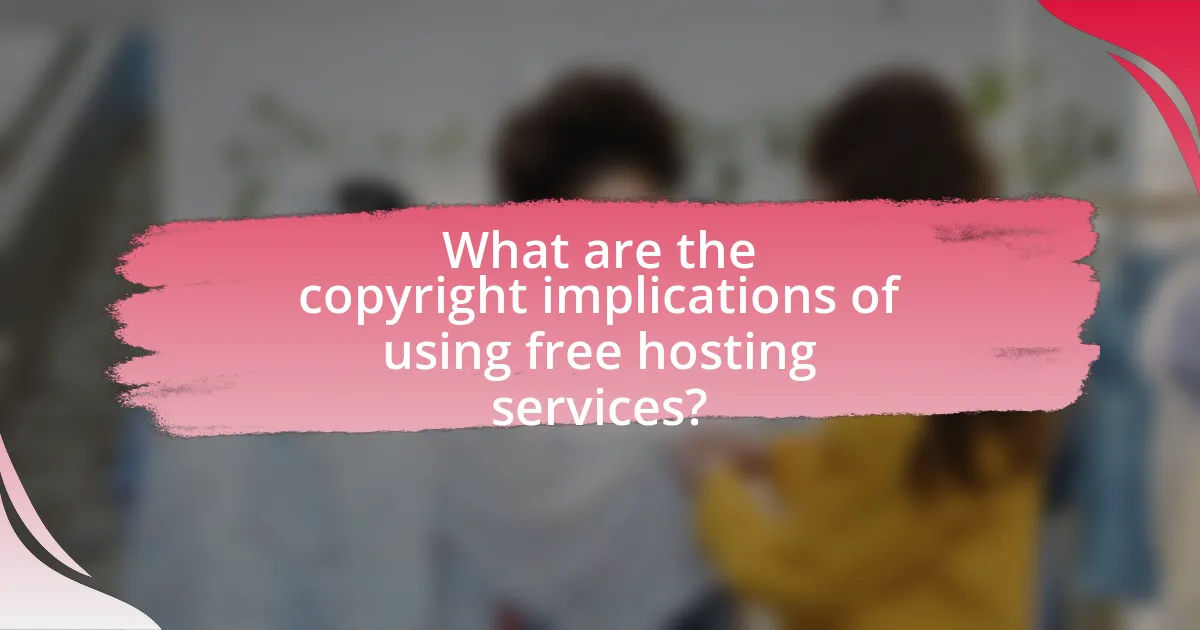
What are the copyright implications of using free hosting services?
Using free hosting services can lead to significant copyright implications, primarily because these services often include terms that grant the provider rights to the content uploaded by users. Many free hosting platforms require users to agree to terms of service that may allow the provider to use, modify, or distribute the content without explicit permission from the copyright holder. For instance, platforms like YouTube and Facebook have policies that allow them to monetize user-generated content, which can infringe on the original creator’s rights if not properly licensed. Additionally, if a user uploads copyrighted material without permission, they may face legal action from the copyright owner, as the user retains responsibility for the content they share. Therefore, it is crucial for users of free hosting services to thoroughly review the terms of service and ensure they have the necessary rights to any content they upload.
How does copyright law apply to content hosted on free services?
Copyright law applies to content hosted on free services in the same way it applies to content on paid platforms, meaning that the original creator retains rights to their work unless they explicitly transfer those rights. Free services often include terms of service that grant the platform a license to use, display, or distribute the content, but this does not negate the copyright holder’s ownership. For instance, under the U.S. Copyright Act, creators automatically hold copyright upon the creation of their work, regardless of the hosting service used. Therefore, users must be cautious about the terms they agree to, as these can affect how their content is used and shared.
What responsibilities do users have regarding copyrighted material?
Users have the responsibility to respect copyright laws by not reproducing, distributing, or publicly displaying copyrighted material without permission from the copyright holder. This obligation is rooted in the Copyright Act, which protects original works of authorship, including literature, music, and art, granting exclusive rights to creators. Users must ensure they have the necessary licenses or permissions to use such material, as unauthorized use can lead to legal consequences, including fines and lawsuits. Additionally, users should be aware that even content shared on free hosting services may still be protected by copyright, necessitating careful consideration of usage rights.
What are the consequences of copyright infringement on free hosting platforms?
Copyright infringement on free hosting platforms can lead to account suspension, legal action, and financial penalties. Free hosting providers often have strict policies against hosting copyrighted material without permission, and violations can result in immediate removal of content or termination of the user’s account. Additionally, copyright holders may pursue legal remedies, which can include lawsuits seeking damages or injunctions against the infringing party. According to the Digital Millennium Copyright Act (DMCA), service providers are required to respond to copyright infringement claims, which can further complicate the user’s situation and lead to additional legal consequences.
What steps can users take to ensure compliance with copyright laws?
Users can ensure compliance with copyright laws by obtaining permission for any copyrighted material they wish to use. This involves identifying the copyright holder, requesting a license or permission to use the material, and adhering to any terms set forth in the agreement. Additionally, users should familiarize themselves with the concept of fair use, which allows limited use of copyrighted material without permission under specific circumstances, such as commentary, criticism, or educational purposes. Understanding the limitations and requirements of fair use is crucial, as misuse can lead to legal repercussions. Furthermore, users should keep records of permissions granted and any licenses obtained to demonstrate compliance if needed.
How can users verify the copyright status of their content?
Users can verify the copyright status of their content by checking the copyright registration with the U.S. Copyright Office or the relevant authority in their country. This process involves searching the copyright database to confirm if the content is registered and to whom it belongs. According to the U.S. Copyright Office, registration provides legal benefits, including the ability to sue for infringement and eligibility for statutory damages. Additionally, users can review the terms of service of the platform where the content is hosted, as these terms often outline copyright ownership and usage rights.
What best practices should users follow to avoid copyright issues?
To avoid copyright issues, users should always seek permission before using someone else’s work. This includes obtaining licenses for images, music, and text, as copyright law protects original works from unauthorized use. Additionally, users should utilize public domain resources or works licensed under Creative Commons, which allow for specific uses without permission, provided they adhere to the terms of the license. Furthermore, users should give proper attribution to creators when required, as this respects the rights of the original authors. Following these practices helps mitigate the risk of copyright infringement and potential legal consequences.
What are the best practices for using free hosting services legally?
The best practices for using free hosting services legally include understanding the terms of service, ensuring compliance with copyright laws, and avoiding prohibited content. Users must read and adhere to the specific terms set by the hosting provider, as these terms outline acceptable use and restrictions. Compliance with copyright laws is crucial; users should only upload content they own or have permission to use, as violations can lead to legal action. Additionally, users should refrain from hosting illegal content, such as hate speech or pirated material, to avoid potential legal consequences. Following these practices helps mitigate legal risks associated with free hosting services.
How can users effectively read and understand terms of service?
Users can effectively read and understand terms of service by breaking down the document into manageable sections and focusing on key components such as user rights, obligations, and limitations of liability. This approach allows users to identify important clauses that may affect their usage of the service. For instance, understanding the section on data usage can clarify how personal information is handled, which is crucial given that a 2021 survey indicated that 79% of consumers are concerned about how their data is used. Additionally, users should look for summaries or highlights often provided by companies to simplify complex legal language, making it easier to grasp essential points.
What resources are available for users to stay informed about legal issues in free hosting?
Users can stay informed about legal issues in free hosting through various resources, including legal blogs, online forums, and government websites. Legal blogs such as the Electronic Frontier Foundation provide insights on digital rights and hosting regulations. Online forums like Reddit’s r/webdev often discuss user experiences and legal concerns related to free hosting. Additionally, government websites, such as those of the Federal Trade Commission, offer guidelines and legal information relevant to hosting services. These resources collectively help users navigate the complexities of legal implications associated with free hosting services.










